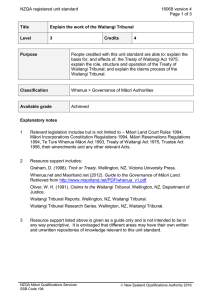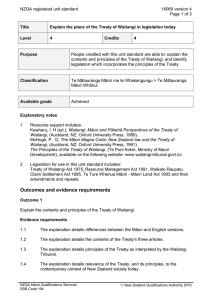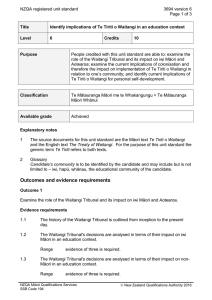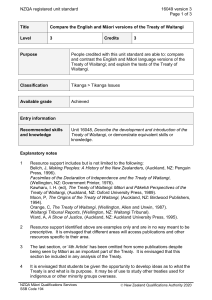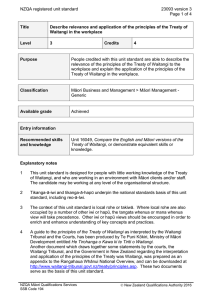NZQA registered unit standard 29233 version 1 Page 1 of 3
advertisement
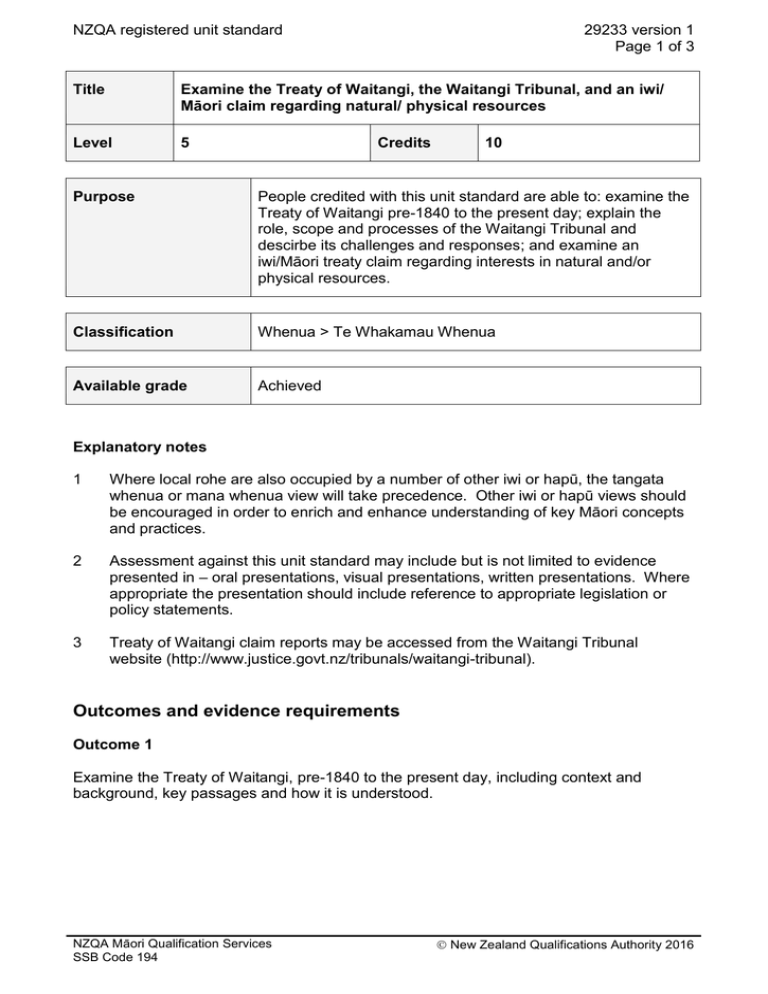
NZQA registered unit standard 29233 version 1 Page 1 of 3 Title Examine the Treaty of Waitangi, the Waitangi Tribunal, and an iwi/ Māori claim regarding natural/ physical resources Level 5 Credits 10 Purpose People credited with this unit standard are able to: examine the Treaty of Waitangi pre-1840 to the present day; explain the role, scope and processes of the Waitangi Tribunal and descirbe its challenges and responses; and examine an iwi/Māori treaty claim regarding interests in natural and/or physical resources. Classification Whenua > Te Whakamau Whenua Available grade Achieved Explanatory notes 1 Where local rohe are also occupied by a number of other iwi or hapū, the tangata whenua or mana whenua view will take precedence. Other iwi or hapū views should be encouraged in order to enrich and enhance understanding of key Māori concepts and practices. 2 Assessment against this unit standard may include but is not limited to evidence presented in – oral presentations, visual presentations, written presentations. Where appropriate the presentation should include reference to appropriate legislation or policy statements. 3 Treaty of Waitangi claim reports may be accessed from the Waitangi Tribunal website (http://www.justice.govt.nz/tribunals/waitangi-tribunal). Outcomes and evidence requirements Outcome 1 Examine the Treaty of Waitangi, pre-1840 to the present day, including context and background, key passages and how it is understood. NZQA Māori Qualification Services SSB Code 194 New Zealand Qualifications Authority 2016 NZQA registered unit standard 29233 version 1 Page 2 of 3 Evidence requirements 1.1 The context and background regarding signing of the Treaty of Waitangi is described. 1.2 Key passages regarding sovereignty/kawanatanga, undisturbed possessions and tino rangatiratanga/taonga and their effects on understandings of the Treaty of Waitangi are analysed. 1.3 The Treaty of Waitangi as it is understood today, its legal status and the body responsible for determining its meaning are described. Outcome 2 Explain the purpose of the Waitangi Tribunal and descirbe its challenges and responses. Evidence requirements 2.1 The reasons for the establishment of the Waitangi Tribunal are described. 2.2 The role of the Waitangi Tribunal as defined under the Treaty of Waitangi Act 1975 is described. 2.3 The challenges and responses of the Waitangi Tribunal since its establishment in relation to role, scope and process is described. Outcome 3 Analyse one claim by iwi/ Māori in relation to alleged breaches of the Treaty of Waitangi regarding their interests in natural or physical resource/s. Evidence requirements 3.1 The reasons for the application, including the alleged breaches and remedies sought by the applicants are described. 3.2 The Waitangi Tribunal’s final decision and recommendations to the Government are described. 3.3 The extent to which iwi/Māori customary values and practices were considered by the Waitangi Tribunal in reaching its decision is analysed and reported on. 3.4 Any subsequent action/s by the Government in response to the Waitangi Tribunal’s recommendations on the selected case, including benefits afforded to the applicants is described. Planned review date NZQA Māori Qualification Services SSB Code 194 31 December 2019 New Zealand Qualifications Authority 2016 NZQA registered unit standard 29233 version 1 Page 3 of 3 Status information and last date for assessment for superseded versions Process Version Date Last Date for Assessment Registration 1 19 November 2015 N/A Consent and Moderation Requirements (CMR) reference 0166 This CMR can be accessed at http://www.nzqa.govt.nz/framework/search/index.do. Please note Providers must be granted consent to assess against standards (accredited) by NZQA, before they can report credits from assessment against unit standards or deliver courses of study leading to that assessment. Industry Training Organisations must be granted consent to assess against standards by NZQA before they can register credits from assessment against unit standards. Providers and Industry Training Organisations, which have been granted consent and which are assessing against unit standards must engage with the moderation system that applies to those standards. Requirements for consent to assess and an outline of the moderation system that applies to this standard are outlined in the Consent and Moderation Requirements (CMR). The CMR also includes useful information about special requirements for organisations wishing to develop education and training programmes, such as minimum qualifications for tutors and assessors, and special resource requirements. Comments on this unit standard Please contact NZQA Māori Qualifications Services mqs@nzqa.govt.nz if you wish to suggest changes to the content of this unit standard. NZQA Māori Qualification Services SSB Code 194 New Zealand Qualifications Authority 2016
